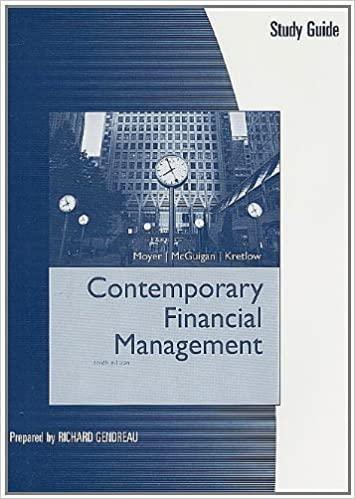1. Determine your required inflation-adjusted annual (pretax) income at age 65. Assume that this annual amount remains...
Question:
2. Determine the amount you must accumulate by age 65 to meet your retirement goal, assuming that you invest in
a. Common stocks
b. Corporate bonds
c. Equally weighted portfolio (50 percent common stocks, 50 percent bonds)
3. Determine the annual investment in common stocks required to accumulate the funds determined in question 2, assuming that the first payment is made at age
a. 30
b. 40
c. 50
4. Determine the annual investment in corporate bonds required to accumulate the funds determined in question 2, assuming that the first payment is made at age
a. 30
b. 40
c. 50
5. Determine the annual investment in an equally weighted portfolio (50 percent common stocks, 50 percent bonds) required to accumulate the funds determined in question 2, assuming that the first payment is made at age
a. 30
b. 40
c. 50
6. What conclusions can be drawn from the answers to questions 3, 4, and 5?
Assume that you are 30 years old today and expect to retire when you reach age 65. If you were to retire today, you would like a fixed (pretax) income of $60,000 per year (in addition to Social Security) for a period of 15 years (your approximate life expectancy at age 65). However, you realize that price inflation will erode the purchasing power of the dollar over the next 35 years and you want to adjust your desired retirement income at age 65 to reflect the decline in the purchasing power of the dollar. In addition to the fixed annual income, payable at the beginning of each year starting at age 65, you want to have assets (i.e., securities investments) of $1,000,000, either for your own needs or to donate to heirs, when you reach 80 years old.
Empirical studies have estimated the average compound rate of price inflation and returns on stocks and bonds over the past 70 years to be approximately
Compound Rate
Inflation .......... 3%
Common stocks ........ 11
Corporate bonds ........ 6
Equally weighted portfolio .... 8.5
(50% common stocks, 50% bonds)
Stocks
Stocks or shares are generally equity instruments that provide the largest source of raising funds in any public or private listed company's. The instruments are issued on a stock exchange from where a large number of general public who are willing... Portfolio
A portfolio is a grouping of financial assets such as stocks, bonds, commodities, currencies and cash equivalents, as well as their fund counterparts, including mutual, exchange-traded and closed funds. A portfolio can also consist of non-publicly...
Fantastic news! We've Found the answer you've been seeking!
Step by Step Answer:
Related Book For 

Contemporary Financial Management
ISBN: 9780324289114
10th Edition
Authors: James R Mcguigan, R Charles Moyer, William J Kretlow
Question Posted:





